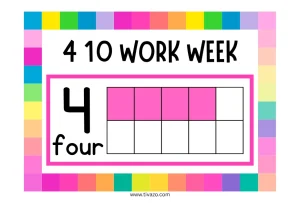Have you ever ended a workday and thought you had a lot done, and then gone through your list only to discover you barely got anything important crossed out? Maybe you rushed through things, but deadlines caught you anyway, or that to-do list just seemed to grow and grow. If this sounds true, you’re not alone. Bad time management is something that many professionals suffer from, but it’s also one of the worst productivity killers around.
It’s not so much about “not having enough hours in a day.” It’s about what you do with those hours that really counts. When time slips away from you, it creates stress, lowers your work quality, and can even end your career growth. But the best part? You can turn it around with the right mind, strategies, and tools.
Now, having the ability to time-manage is more than a good skill to have; it is essential. Bad time management sneaks up on all of us, leading to missed deadlines, hopelessness, and always rushing around. However, understanding what causes it and how to fix it can be the difference-maker.
Here, we’re going to take you through what bad time management is, how to spot it, how it impacts your work life, and how to fix it in easy ways. And, we’re going to show you examples of how tools like Tivazo can help you regain control of your day and boost productivity.
💡Key Highlights:
- What is Bad Time Management?
- Signs of Bad Time Management
- 7 Common Effects of Bad Time Management at Work
- Expert Quotes and Statistics on Bad Time Management
- How to Fix Common Bad Time Management
- How Tivazo Can Solve Bad Time Management at Work
- Conclusion
What Is Bad Time Management?
Bad time management is when you fail to plan or organize your time, causing you to lose your priorities, procrastinate, and end up less productive.
In other words, bad time management means being unable to organize your day, prioritize work, or stay on track despite distractions. This typically results in working long hours but getting less done. You might be doing too many projects, procrastinating until the eleventh hour, or focusing on what must be done first and letting everything else slide. While we all experience a little chaos at some point, ongoing bad time management can wreak havoc on your productivity and career advancement. Being aware of and addressing bad time management is all about working smarter, not harder.
Signs of Bad Time Management

Considering whether you’re suffering from poor time management? Take a look at these typical signs to keep an eye out for, and trust me, if you recognize a few, you’re not the only one.
1. You Procrastinate… a Lot
We’ve all done it, avoiding that crucial task by checking your phone, cleaning your desk, or even getting another coffee. However, procrastination is a serious habit when it becomes a way of life, and that’s a huge red flag for poor time management. Putting off work accumulates stress because deadlines are now looming over your head. If you find yourself regularly avoiding what is truly important, it’s time to re-evaluate the way you manage your time.
You May Also Like: How To Beat Procrastinating At Work: Stop Delaying Important Tasks
2. Deadlines Are Getting Away
Missing deadlines isn’t bad luck, it typically shows bad time management. When you’re constantly rushing at the last minute or going over on projects past deadlines, it means that you’re not planning or prioritizing. Deadlines are more than dates on a calendar, they’re promises of how you prioritize your work. When deadlines get away from you, it’s a sign that your time isn’t under management.
3. You Do Too Much
It is tempting to just agree to everything that is asked of you, but it normally doesn’t turn out to be so great. Having too many projects to work on leads to poor time management because you are doing too much. Instead of doing a few things properly, you hasten in order to accomplish everything and worry yourself sick about it. It’s okay to set limits, your time is valuable and to thin it out too much only makes you less productive.
4. Your Workspace and Day Seem Unorganized
Is your workspace messy? Do you start the day with no plan? Both are signs of poor time management. When your environment and calendar appear to be in disarray, you waste precious minutes searching for something or attempting to know what to do next. That doubt holds you back and adds unnecessary tension. Keeping your space and day tidy is a simple change that makes a huge difference.
5. Distractions That Always Distract You
Do you find yourself easily derailed by emails, messages, social media, or gossipy coworkers? When distractions catch up with you, it’s a sign that your time management is subpar. Your attention gets divided, tasks drag on, and mistakes find their way in. You won’t be able to do anything meaningful if you don’t set boundaries or cut out distraction time.
6. Everything’s Urgent. But Nothing Is Important
Rushing from one “urgent” thing to the next and never actually making progress on your true goals is a guaranteed bad time management pitfall. When every little thing is screaming “now,” nothing gets the attention that it deserves. It’s like spending all day suppressing fires and never building anything of value. Having the ability to know what’s truly imperative can keep you out of circles.
You May Also Like: Mastering Interpersonal Skills in the Workplace: Your Guide to Career Success
7. You Frequently Feel Overwhelmed and Behind
If you’re always in catch-up or drowning-in-work mode, that’s a big red flag of bad time management. That feeling isn’t just frustrating, it drains the energy and motivation right out of you. If you don’t manage your time, the to-do list accumulates faster than you can keep up, and you’re stuck in overwhelm and falling behind.
Observing these warning signals in time is the first step in correcting faulty time management and getting back on the right track.
7 Common Effects of Bad Time Management at Work

Bad time management at work is not just a personal flaw. It carries over into every facet of your life at work, right down to how much you like being there. Here are seven ways in which poor time management can actually derail your work life.
1. Your Productivity Suffers
As poor time management sets in, you will realize your productivity takes a big hit. What is supposed to take an hour takes double the time since you are not focusing well or prioritizing well. You may be working hard, but if you are not managing your time properly, all that work will not be translated into output.
This means you’re not just slowing yourself down, the whole team can feel the impact. When your work falls behind, others waiting for your part get held up too. Plus, the bigger picture of meeting business goals starts slipping away because the important stuff isn’t getting done on time.
If you want to be productive and efficient at the workplace, enhancing time management is imperative. Once you enhance your time management, you’ll discover how much more you can do without burning out.
2. Stress Becomes a Constant Companion
Stress and bad time management go hand in hand. When you’re always scrambling to finish tasks or juggling too many things at once, your stress levels shoot up fast. It’s like being on a never-ending treadmill where you’re running but not getting anywhere.
This constant pressure can actually interfere with your mood and attention. Instead of handling your work in a comfortable way, you’re worried, anxious, and overwhelmed. Over time, that type of stress will result in burnout, and nobody wants that. It’s not just about mental health; chronic stress can also affect your body, leading to headaches, fatigue, and worse health consequences.
By getting poor time management out of the way up front, you can avoid this vortex of stress. Pacing yourself and planning gives you room to breathe, so work is doable, not a pressure cooker.
You May ALso Like: 7 painful types of stress, Effects and their control
3. The Quality of Your Work Drops
Have you ever rushed to get something done and had it be filled with mistakes or missing key information? That’s the classic sign of ineffective time management at work. When you don’t give yourself adequate time, it takes a hit in quality because you’re hurrying along or trying to do too much at once.
Instead of quality, well-written work, you are left with errors that you or your employees have to fix afterward. That not only wastes time, it damages your reputation as well. People doubt whether they can trust you to do your best.
If you wish to be professional and reputable, good time management is a must. It enables you to slow down enough to do quality work that you can stand behind, rather than rushing and hoping for the best.
4. Your Reputation Suffers
Lack of good time management quickly becomes a bad habit at the workplace. When you’re perpetually late to deliver deadlines or present work that’s poorly done or unfinished, then someone is going to notice. Soon, you might end up getting a reputation for being unreliable or careless.
That’s a reputation that’s difficult to shed. It haunts you in meetings, review time, and when new projects come along. Even if you’re talented, others will be hesitant to assign major responsibilities to you if they doubt your time management skills.
Your reputation is your brand, it’s how you advance professionally. Improving poor time management enables you to build other people’s trust and prove that you’re responsible and professional.
5. Your Working Relationships Are Affected
Bad time management, causing delays or mistakes, affects not just you but also everyone you work with. Imagine your team relying on you to get your portion done, only to have to make rushes and mistakes at the last minute. That will generate frustration and tension.
Coworkers and supervisors may believe they can’t rely on you, so collaboration becomes harder and less enjoyable. These disagreements usually end up as stressful arguments or conflicts that nobody wants.
By taking control of your time, you make your whole team successful. When you are organized, relationships get a little tighter because other people know you as a good, supportive teammate.
6. Career Growth Slows Down
Those who are effective in utilizing their time are the ones who are noticed. They deliver tasks on time, execute responsibilities with confidence, and show leadership abilities. If you’re overwhelmed by bad time management, those opportunities might go out of your hands.
Managers look for employees who can multitask without being kept in mind at every moment. When you fall behind in maintaining the pace, you might lose promotions, increments, or challenging assignments that can push your career to the next level.
Getting control over your time is a way to open doors. It shows you’re ready for bigger roles and responsibilities, helping your career move forward instead of stalling.
7. Job Satisfaction Takes a Dive
Working under constant pressure because of bad time management can make your job feel like a grind. When you’re overwhelmed and can’t see progress, it’s easy to lose motivation and enjoyment.
That accumulates into burnout, where you are exhausted and disconnected from your work. It even gets you to want to resign at times because the pressure becomes too much.
By changing your time management habits, you can recover your job satisfaction. Whether you think you can control your workday or not, you will love your work and be motivated in the long run.
Poor time management affects far more than how you are spending your hours, it infects every part of your work life. The realization of these effects is the start of making changes that allow you to work smarter and feel better each day.
You May Also Like: 10 Proven Ways to Boost Job Satisfaction at Work
Expert Quotes and Statistics on Bad Time Management
Understanding why poor time management affects professionals or not isn’t just a personal experience; it’s backed up by experts and cold facts. Let’s find out what the experts and facts have to say regarding this common phenomenon.
“Time management isn’t about getting more stuff done; it’s about getting the right stuff done well,“.
says productivity expert David Allen, author of Getting Things Done. What this saying is referring to is that bad time management is not generally a matter of not working hard, but working on the wrong projects or not prioritizing. When you squander your time, you are wasting energy on things that don’t take you where you want to go, and this decreases your overall productivity.
As per the American Psychological Association survey, stress due to inefficient time management ranks high among the causes of workplace burnout, with close to 60% of employees agreeing that their job stress was an immediate result of them feeling overwhelmed by deadlines and workload. That one figure should be a wake-up call on its own. Bad time management not only impacts your work performance, but it can really damage your health.
According to Harvard Business Review, workers who have trouble managing their time spend as much as 40% of their workweek on mundane tasks or distractions. That’s almost two whole days gone each week just because of poor time habits. Think about what you could do with that time back!
Time management guru Laura Vanderkam reminds us,
“You can’t make more time, but you can make better use of the time you have.”
Direct and powerful advice as it is, it means that doing a better job of organizing your day isn’t working longer hours, it’s working smarter hours, which bad time management keeps you from doing.
These statistics and findings simply state that poor time management is a widespread problem with serious consequences. The good news is, however, that anyone can improve and take back control of their workday with the right attitude and tools.
How to Fix Common Bad Time Management

The good news? Bad time management is fixable. You don’t need to overhaul your life overnight, small, consistent changes make a huge difference. Here are some practical steps to help you get on track:
1. Define Clear, Realistic Goals
Start by determining what it is that you wish to accomplish. Use the SMART goal strategy:
- Specific: Be precise about what you would like to do.
- Measurable: Know how you will track progress.
- Achievable: Set goals in a way that makes them attainable.
- Relevant: Make sure the goals align with your bigger goals.
- Time-bound: Set deadlines to make it time-sensitive.
Clear goals make you stay motivated and focused.
Read More: SMART Framework for Goal Setting theory: Achieve Success
2. Prioritize Well with the Eisenhower Matrix
Not all tasks require your immediate attention. The Eisenhower Matrix helps divide tasks into:
- Urgent and important: Do them first.
- Important but not urgent: Schedule to do them.
- Urgent but not important: Delegate when you can.
- Neither Important nor Urgent: Drop them.
This strategy keeps you focused on what really gets the needle to move.
3. Plan Your Day (and Stick To It)
Make a daily schedule with blocks of time for each task. Be realistic—don’t block your day so tightly that you have no room for breaks. Working with time blocks is how to stay on track and avoid multitasking.
4. Remove Distractions
Identify what distracts you and move to minimize it:
- Turn off unnecessary notifications.
- Employ “Do Not Disturb” modes during concentration sessions.
- Employ a quiet working environment or noise-canceling headphones.
As you protect your concentration, work gets done faster and better.
5. Learn to Say No and Delegate
It’s tempting to say yes to everything, but that’s a fast track to burnout. Prioritize your workload and delegate tasks that others can handle. Saying no doesn’t mean you’re unhelpful, it means you’re smart about your time.
6. Track Your Time with Tools
Having a time-tracking tool like Tivazo might make you see how you spend your day. It shows you where time is leaking so you can move and realign. And it keeps you on track.
7. Regular Review and Adjustment
Spend a few minutes a day or a week thinking about what worked and what didn’t. Make necessary adjustments to your approach. Time management is not something you do once; it’s a skill you hone over time.
How Tivazo Can Solve Bad Time Management at Work

If you’ve tried different methods but still feel stuck, it might be time to bring in a tool designed to help, like Tivazo. Tivazo helps improve bad time management at work by following:
1. Real-Time Monitoring of Time
Tivazo lets you track your time in real-time, so you precisely know how much time anything takes. No longer estimates or underestimates your workload.
2. Reports to Identify Distractions
The program generates reports that detail where you spend your time on a daily, weekly, or project level. This will reveal to you what distractions or busy work steal your time.
3. Organize Tasks and Deadlines
Tivazo is not just a timer; it also schedules work and deadlines in one place. This keeps your projects at your fingertips and under your management, so you don’t have to scramble at the last minute.
4. Integrities Keeping You in Flow
It connects with other tools you’re likely already using, like project management or comms tools. This stops round-tripping between tools, so there’s less to learn.
5. Reminders and Alerts Keep You on Track
Remind yourself of deadlines or breaks. These reminders keep you in motion and prevent burnout.
6. Boost Team Collaboration
For teams, Tivazo gives team visibility into what everyone is working on and for how many hours they work. Transparency encourages cooperation and accountability.
Conclusion
We all make bad time management more often than we might know, but that does not take away from how bad it is. If not addressed, it damages your productivity, builds stress, negatively impacts your quality of work, and can decline your career.
The best news is that you can fix it. With knowledge of the symptoms and results of bad time management, and the implementation of smart strategies like goal setting, prioritization, scheduling, staying away from distractions, and delegation, you can get your time back and your sanity, too.
With a powerful tool like Tivazo, you do it even better, having insight, structure, and accountability that lead you down the path to productivity.
Start today. Be truthful with yourself about how you’re spending your time, try these recommendations, and see how better habits change not just your workday, but your whole career path.
Want to take charge of your time and boost productivity?
Start using Tivazo and find out how it can help you avoid bad time management from holding you back.




